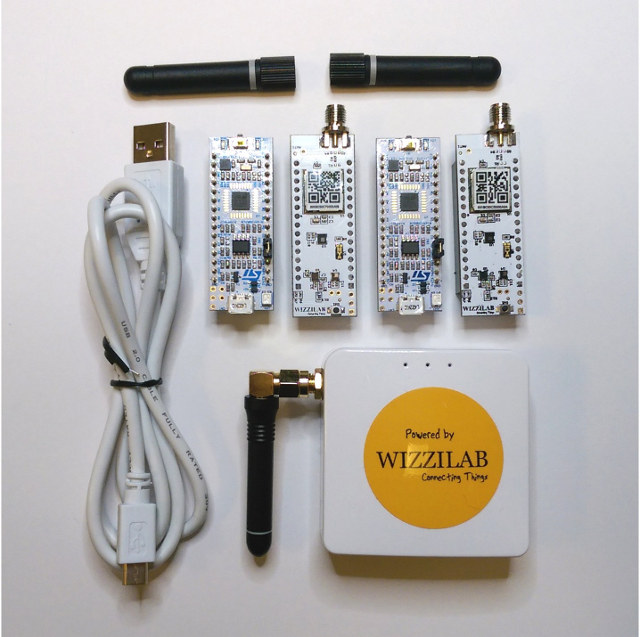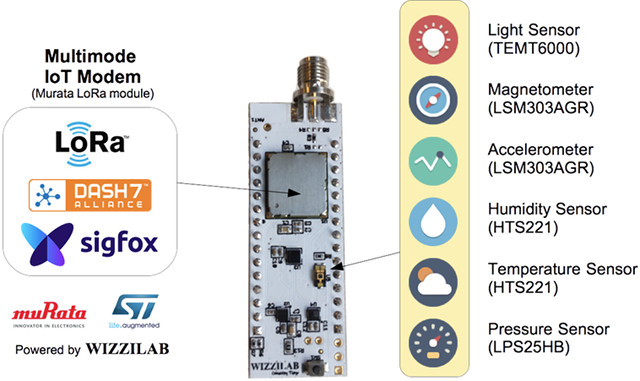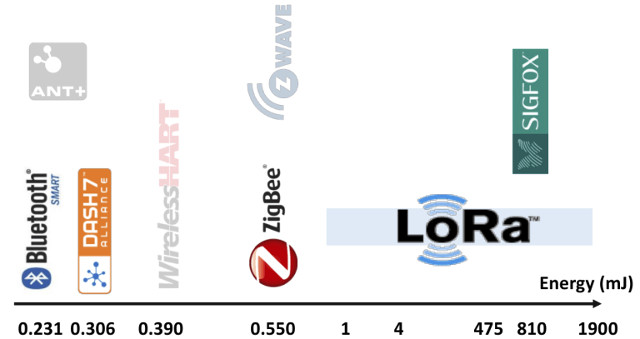Over the last few years, I’ve written several article about LoRaWAN, Cellular IoT, and Sigfox based long range low power IoT solutions. DASH7 is another LPWAN (Low Power Wide Area Network) standard that operates on the same 868 and 915 MHz ISM bands as LoRa and Sigfox, but has much lower power consumption, and the cost of a shorter range up to 500 meters, instead of the 5+km associated with LoRa or SigFox.
The DASH7 Alliance Protocol (D7A) is an Open Standard, and if you want more details you can download version 1.1 of the specifications on DASH7 Alliance website. I’m writing about DASH7 today thanks to an article on ST blog about Wizzilab’s Wizzikit, an evaluation kit and framework for DASH7 with a gateway, and several nodes that can also optionally support LoRaWAN and Sigfox protocols.

The kit is comprised of the following items:
- WizziGate GW2120 Ethernet/Wifi/Dash7 gateway – based on GL-iNet AR150 router – with antenna for the selected band (868/915 MHz) and USB power cable.
- 2x Nucleo-L432KC STM32 development board compatible with Arduino. mbed, and ST morpho
- 2x D7A SH2050 Nucleo Shield with a multimode Murata Lora Module supporting LoRa, DASH7, and Sigfox, as well as four sensor chips: light sensor, magnetometer & accelerometer, humidity and temperature sensor, and a pressure sensor.
- 2x mini USB cable to power up and program the Nucleo boards

You’ll also need to add you own USB power adapter for the gateway. The kit also comes with access to the company’s DASH7Board cloud service. The Wiki includes some information, including a quick start guide explaining how to register the gateway, and start loading the demo code using mbed. Since DASH7 is much more power efficient than LoRaWAN it can either be used to prolong battery life, or to send more frequent messages for example to control actuators. With LoRaWAN, downlink access can only be initiated by the end node, but DASH7 is bi-directional allowing for OTA firmware upgrades. The solution was showcased a few months ago at ST Techday with two demos: sending a message to a single node, and OTA code upgrade (actually picture upload) to multiple boards with a broadcast message.
Wizzilab’s Wizzikit is sold for 299.00 Euros with either 868 and 915 MHz band. Further details on be found on Wizzilab website.

Jean-Luc started CNX Software in 2010 as a part-time endeavor, before quitting his job as a software engineering manager, and starting to write daily news, and reviews full time later in 2011.
Support CNX Software! Donate via cryptocurrencies, become a Patron on Patreon, or purchase goods on Amazon or Aliexpress






Can we please start showing the effective BPS of systems your articles are talking about.
LORAwan etc is great for meter reading etc but will it really have any other significant uses?
I feel LORA is a bit like the CLOUD a technology waiting for something to happen.
Can LORA be a Wifi to Wifi Bridge? if so what is a reasonable throughput to realistically expect?
@Seasalt
All the LPWAN standards only support a few kilobit per seconds, the expected bps is shown in the list of LPWAN standard linked to in the introduction. The D7A will be better, but it’s not designed for high bitrate either.
If you want something with high bitrate (similar to home wifi) and long range, it can’t be low power at the same time, you need some other solutions maybe a lower end version of something like https://www.cnx-software.com/2017/06/27/ligowave-ligoptp-bridges-allow-wireless-point-to-point-communication-up-to-100-km/
@Jean-Luc Aufranc (CNXSoft) do you know what happened to Haystack Technologies that was doing a lot of work in this space?
Patrick Burns’ articles on Dash7 XR Mode version 2 and 3rd generation LoRa SOCs from STMicro make for very interesting reading but they’re from 2019/2020…
The company is marked as “permanently closed” on Google Maps, but I don’t know more than that.
I went to Google News searching for “Dash7” and all I see are planes 🙂
If I search for “Dash7 sensor” this CNX Software article comes up… It does not look like the standard has gained any traction.
Thanks for your reply! Indeed. The most recent reference I’ve found with respect to DASH7 hardware is STMicro employee Roman Ludin’s reply about the new STM32WL5MOC’s compatibility. Wizzilab appears to still be going but the Medium articles by Burns seemed to indicate really interesting DASH7 development by Haystack. OpenTag’s GitHub readme notes at the end that there is Haystack’s further developed API fork (where new “proprietary” features get mainlined after six months) but I haven’t found that yet. It would be interesting to see whether anyone’s forked and maintained the Haystack API. JP Norair mentions in the STMicro community forum… Read more »